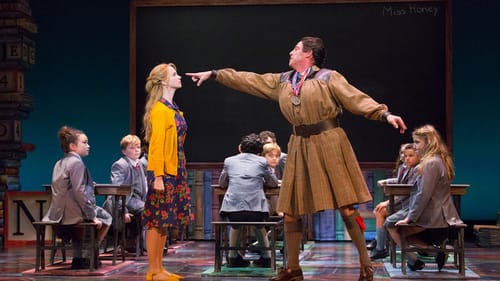Stay in the Loop
BSR publishes on a weekly schedule, with an email newsletter every Wednesday and Thursday morning. There’s no paywall, and subscribing is always free.
Out of her way!
Walnut Street Theatre presents Roald Dahl's 'Matilda the Musical'

Matilda the Musical brings to the Walnut Street Theatre’s 110th season that courageous, indomitable girl filled with imagination and spunk, fighting against the oppressive ogres of adulthood. This 2010 British musical and Broadway hit — still running on London’s West End — is based on Roald Dahl's beloved “kiddie noir” novel.
A former World War II air ace and husband of American actress Patricia Neal, Dahl also wrote Charlie and the Chocolate Factory and James and the Giant Peach (both transmuted for the stage). He could merge bleak and dark with childhood whimsy like no one else (though Lemony Snicket has picked up his mantle). And this musical’s book, by Dennis Kelly, and songs, by Tim Minchin, brilliantly capture Dahl’s vision of childhood and boarding school.
The kids aren't all right
Precocious autodidact Matilda Wormwood (Jemma Bleu Greenbaum) is stranded in an ugly, intellectually drear home peopled by a stupid grasping father (Christopher Sutton in a lively vaudeville turn), ballroom-dance-crazy mother (Lyn Philistine, also a great belter) and doltish brother (Mark Donaldson). Matilda taught herself to read, much to the family’s dismay. Nonetheless, she longs for communion with them, her every effort rebuffed.
Sent to an abusive and equally soulless prep school, Matilda has no choice but to revolt and take a smart kid’s revenge on everyone, including wily headmistress Miss Trunchbull (Ian Merrill Peakes in fabulous drag). Only two adults see Matilda for the imaginative and special child she is: loving librarian Mrs. Phelps (Demetria Joyce Bailey) and timid teacher Miss Honey (Laura Giknis), who finds strength by caring for Matilda.
The huge cast includes a cadre of 10 beleaguered and belittled “revolting children,” played by Philadelphia youngsters who are also students in WST’s theater school. They are a talented bunch with several standouts, but their work seems sometimes frenetic and forced. In the demanding lead role, Greenbaum gives an affecting performance, though she is periodically vocally and dramatically stretched.
An ensemble of 16 strong, versatile actors anchors this production, swinging smoothly from adult characters to big (sometimes bullying) children. And swing they do — they are great dancers and singers, and their ensemble work adds heft and stability to the production numbers.

Big cast, big talent
Peakes’s Miss Trunchbull takes the form of the “Dame,” a stock British panto character (always played in drag), but here, she’s every student’s bigger-than-life nightmare. Padded, cinched, and bursting out of his costume, Peakes’s physical unpredictability, oddly limber presence (Trunchbull was a former champion hammer thrower), sly asides to the audience, and fearlessness as a performer bring the character to roaring life. Peakes is at the top of his game here and he’s game for anything.
Designer Robert Koharchik created charming towers of sculptural books that provide playing space for Michelle Gaudette’s polished choreography. Music director and keyboardist John Daniels keeps singers large and small on track as he leads a zippy 11-piece ensemble from the pit. But at this performance, the sound was slightly booming and levels seemed inconsistent, often obscuring the clever lyrics that give Matilda its strength.
Linda Goodrich expertly directs this challenging big-cast show, allowing the storyline — which increases in complexity and depth as the evening surges forward — to merge smoothly with the music.
Kelly and Minchin wrote a rangy yet surprisingly delicate work capturing the semi-hallucinatory quality of Dahl’s stories; Goodrich is sensitive to its shifts and patterns. Big boffo turns and ballroom-dance segments, as well as snappy solo and chorus numbers, often change quickly into intimate, moving songs, furthering the tale.
The second act begins with straight vaudeville but quickly deepens and moves to richer territory. It also holds three well-handled and especially telling moments: the double-edged ensemble number “When I Grow Up”; a skillful segue into Matilda’s haunting “Quiet” after the high-energy “Smell of Rebellion”; and Giknis’s heartbreakingly beautiful interpretation of “My House.”
Walnut Street Theatre and Goodrich’s strong production of Matilda the Musical — with its message of triumphant persistence that can shape destiny — make for a great holiday match.
What, When, Where
Matilda the Musical. Book by Dennis Kelly, music and lyrics by Tim Minchin, based on the classic novel by Roald Dahl, Linda Goodrich directed. The show runs through January 6, 2018, at the Walnut Street Theatre, 825 Walnut Street, Philadelphia. (215) 574-3550 or walnutstreettheatre.org.
Open captioning at the 7pm performance on December 2; the December 12 performance will be ASL interpreted and audio described.
Sign up for our newsletter
All of the week's new articles, all in one place. Sign up for the free weekly BSR newsletters, and don't miss a conversation.

 Gail Obenreder
Gail Obenreder